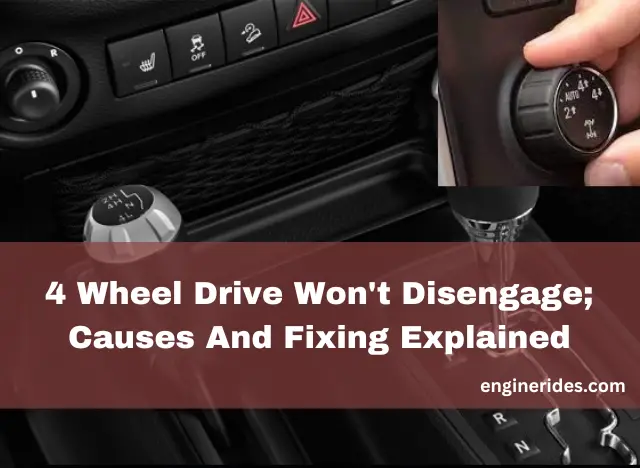Is getting a new transmission for your vehicle a smart move financially? We’ll explore whether upgrading your car’s transmission can actually make your car worth more when it comes time to sell or trade it in. Let’s break it down in simple terms to help you decide about this important vehicle upgrade.
Table of Contents
Does A New Transmission Increase Value?

No. Installing a new transmission in your vehicle does not typically increase its resale value significantly. While a new transmission can improve your car’s overall functionality and reliability, it rarely translates into a higher market price when it’s time to sell. Several factors contribute to this:
- Depreciation: All vehicles, regardless of their condition, experience depreciation over time. This means that your car’s value will still decline even with a new transmission.
- Market Value: Buyers often base their purchasing decisions on the make, model, mileage, and overall condition of the vehicle. A new transmission may not be a significant selling point compared to these factors.
- Cost vs. Value: The expense of replacing a transmission can be substantial. The increase in resale value is usually far less than the transmission replacement cost.
- Maintenance History: A well-documented maintenance history, including regular transmission servicing, can positively influence resale value. However, simply replacing the transmission may not have the same impact as a comprehensive maintenance record.
In summary, while a new transmission can make your car more reliable and enjoyable to drive, it’s unlikely to result in a substantial increase in resale value due to the complex factors affecting a vehicle’s market price.
What does a new transmission do for a car?

A new transmission can have several significant benefits for a car:
- Improved Performance
A new transmission can enhance your vehicle’s performance by providing smoother and more efficient gear shifts. This can result in better acceleration, smoother driving, and improved fuel efficiency.
- Reliability
A new transmission can increase the overall reliability of your car. It reduces the risk of transmission-related breakdowns and issues, which can be costly and inconvenient.
- Extended Lifespan
Replacing an old or failing transmission can extend the overall lifespan of your vehicle. It prevents further damage to other components due to a malfunctioning transmission.
- Enhanced Towing Capacity
Upgrading to a new transmission with a higher torque capacity can improve your car’s ability to tow heavy loads, making it more versatile for activities like towing trailers or boats.
- Resale Value
While it doesn’t typically increase the resale value significantly, a new transmission can make your car more attractive to potential buyers. It may help maintain its value better than a vehicle with a worn-out transmission.
A new transmission can significantly enhance your car’s performance, reliability, and longevity, ultimately improving your driving experience and reducing the likelihood of costly repairs.
Does a new transmission reset miles?

No, installing a new transmission in your vehicle does not reset the recorded mileage on your odometer. The odometer is a mechanical or electronic device that keeps track of the total distance your vehicle has traveled throughout its lifetime. Replacing the transmission doesn’t alter or reset this reading because it’s unrelated to the transmission itself.
Mileage is critical when assessing a vehicle’s value, as it provides insight into its overall wear and tear. When you replace the transmission, the odometer records the same total mileage, accurately reflecting the vehicle’s history.
However, a new transmission can improve your vehicle’s performance and extend its lifespan, indirectly making it more appealing to potential buyers and potentially mitigating the effects of high mileage when it comes to resale or trade-in value.
What are the benefits and drawbacks of a new transmission?
| Benefits of a New Transmission | Drawbacks of a New Transmission |
|---|---|
| Improved Performance: A new transmission can result in smoother gear shifts and better acceleration, enhancing your vehicle’s overall performance. | Costly Investment: Installing a new transmission can be expensive, including the cost of the transmission itself and the labor involved. |
| Enhanced Reliability: A new transmission reduces the risk of breakdowns and transmission-related issues, providing a more reliable and hassle-free driving experience. | Limited Increase in Resale Value: While it can make your vehicle more appealing, a new transmission typically doesn’t significantly increase the resale value. |
| Extended Vehicle Lifespan: Replacing an old or failing transmission can extend your car’s overall lifespan, preventing further damage to other components. | Potential Compatibility Issues: Ensuring the new transmission is compatible with your vehicle’s make and model can be challenging and may require additional modifications. |
| Better Fuel Efficiency: A new transmission can lead to improved fuel efficiency, saving you money on fuel costs over time. | Labor-Intensive Installation: Installing a new transmission is a labor-intensive process, contributing to the overall cost of the upgrade. |
| Enhanced Towing Capacity: Upgrading to a new transmission with higher torque capacity can improve your car’s ability to tow heavy loads, making it more versatile for towing trailers or boats. | Possibility of Future Repairs: While a new transmission is reliable, other vehicle components may still require maintenance or repairs in the future. |
| Smoother Shifting: A new transmission typically provides smoother and more comfortable gear shifting, enhancing your driving experience. |
It’s important to weigh these benefits and drawbacks carefully when considering a new transmission, as the decision should be based on your specific vehicle, its condition, and your driving needs.
Chevy Volt “Not Able To Charge”; What Does It Mean?
enginerides.com
Is rebuilding a transmission worth it?
Rebuilding a transmission can be worth it in certain situations. It’s a cost-effective alternative to buying a new transmission, especially when your vehicle is relatively young and in good overall condition. If your transmission has suffered specific issues but the rest of the vehicle is sound, a rebuild can restore its functionality, extending the lifespan of your car without the expense of a complete replacement.
However, the worthiness of a transmission rebuild depends on factors like the vehicle’s age, mileage, and the quality of the rebuild itself. If your car is older or has high mileage, investing in a rebuild might not be the most economical choice, as other components may also be nearing the end of their lifespan. It’s crucial to consult a trusted mechanic who can assess your situation and guide you on whether a transmission rebuild is a wise investment.
Is it better to buy a used or new transmission?
Whether it’s better to buy a used or new transmission depends on several factors, including your budget, vehicle condition, and long-term plans for the car. Here are some considerations to help you decide:
Used Transmission
- Cost-Effective: Used transmissions are generally cheaper upfront, making them a more budget-friendly option if you’re trying to minimize costs.
- Compatibility: A used transmission is more likely to be a direct fit for your vehicle, ensuring compatibility.
- Environmental Impact: Opting for a used transmission can be seen as a more environmentally friendly choice, as it reduces the demand for new manufacturing.
Drawbacks:
- Uncertain History: You may not know the exact history of a used transmission, including how well it was maintained or if it has hidden issues.
- Limited Warranty: Used transmissions typically come with shorter or no warranties, leaving you with potential repair costs if problems arise.
New Transmission
- Reliability: New transmissions are generally more reliable and less likely to have hidden issues compared to used ones.
- Warranty: New transmissions often come with warranties that provide peace of mind and protection against unexpected repair expenses.
- Longevity: A new transmission can extend the lifespan of your vehicle and provide many trouble-free miles.
Drawbacks
- Higher Cost: New transmissions are significantly more expensive upfront, which can be a financial burden.
- Compatibility: Depending on your vehicle, a new transmission may require modifications or additional components, increasing the overall cost.
Ultimately, the decision depends on your specific circumstances and priorities. If you have an older vehicle with high mileage, a used transmission might be a cost-effective choice for short-term reliability. However, a new transmission could provide better long-term value and peace of mind if you plan to keep the vehicle for a long time or have a newer car. Consulting with a trusted mechanic can help you make an informed choice based on your vehicle’s condition and budget.
Why does the Gas coming out of exhaust? All You Need To Know
enginerides.com







2 Comments